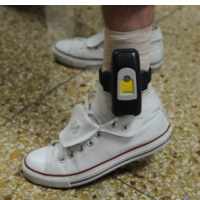False Positives and False Promises Overwhelm GPS Monitoring of Criminals
 (photo: EKA Photography)
(photo: EKA Photography)
So far, stories about California’s problematic tracking of criminals on probation and parole using Global Positioning System (GPS) devices have highlighted their propensity for failure, sometimes with the active assistance of their hosts.
When the Los Angeles Times wrote back in December about dangerous criminals roaming about the county, offline, because of malfunctioning and tampered-with GPS units, Supremacy Claus in the Comments section remarked, “Follow the money!”
“I'll bet that there are many more false alarms (prisoners in compliance who have a malfunctioning GPS through no fault of their own) than people who disable/remove their GPS. LE and the Justice System do not want any meaningful analysis and reports about this problem because they do not want a fully informed public. . . . I have talked to POs who have said that checking every alert would take up way more than 100% of everybody’s time. THAT is the dirty little secret!”
It might not really be that much of a secret. The Times reported over the weekend that GPS false positives are overwhelming Los Angeles County probation officers and enveloping real alerts. Deputies receive up to 1,000 alerts a day.
Most of the false positives are predictable and were actually predicted.
An alert goes off when contact with the wireless ankle strap-on device is lost, even if the signal was just blocked by a building or lost to a dead battery. It also goes off if the wearer travels someplace he shouldn’t be. Since California passed Jessica’s Law in 2008 and strapped GPS devices on sex offenders, those 4,800 someplace in L.A. County include schools, parks, daycare facilities and other places that appear, on average, every square mile.
“Just riding the Red Line would set off 10 alerts,” John Tuchek, a county probation supervisor and union official, told the Times. The state has nearly 84,000 sex offenders.
A two-year study conducted in Arizona, completed in 2011 by researchers from Sam Houston State University, found that community corrections supervisors estimated “70% of alerts are false alarms usually related to technology issues.” The study, published in the Journal of Criminal Justice, previewed all the problems being experienced in California, and came with a warning that GPS should be used as a tool, not a control mechanism.
California was using it as a control mechanism years before electing to meet federal court-ordered prison-downsizing orders by redirecting low-threat felons into the county jail and probation system, confident that GPS would provide a low-cost virtual prison.
“A divergence between legislative goals and practical application of mandated GPS monitoring programs exists,” wrote program co-author Gaylene Armstrong, research director of the Correctional Management Institute of Texas at the College of Criminal Justice.
That’s a polite way of saying GPS won’t do what government officials say it will.
–Ken Broder
To Learn More:
GPS Monitoring Alerts Overwhelm Probation Officers (by Paige St. John, Los Angeles Times)
State Quietly Replaced Thousands of Vulnerable Parolee GPS Trackers (by Ken Broder, AllGov California)
One in Four GPS Devices on Criminals in L.A.. County Were Faulty (by Paige St. John, Los Angeles Times)
SHSU Studies GPS Monitoring of Arizona Sex Offenders (Sam Houston State University)
Progress v. Privacy: The Debate Over Computer Chip Implants (by Dean Unatin, UCLA Journal of Law and Technology)
Examining Gps Monitoring Alerts Triggered by Sex Offenders: The Divergence of Legislative Goals and Practical Application in Community Corrections (by Gaylene S. Armstrong and Beth C. Freeman, Journal of Criminal Justice)
- Top Stories
- Controversies
- Where is the Money Going?
- California and the Nation
- Appointments and Resignations
- Unusual News
- Latest News
- California Forbids U.S. Immigration Agents from Pretending to be Police
- California Lawmakers Urged to Strip “Self-Dealing” Tax Board of Its Duties
- Big Oil’s Grip on California
- Santa Cruz Police See Homeland Security Betrayal in Use of Gang Roundup as Cover for Immigration Raid
- Oil Companies Face Deadline to Stop Polluting California Groundwater





